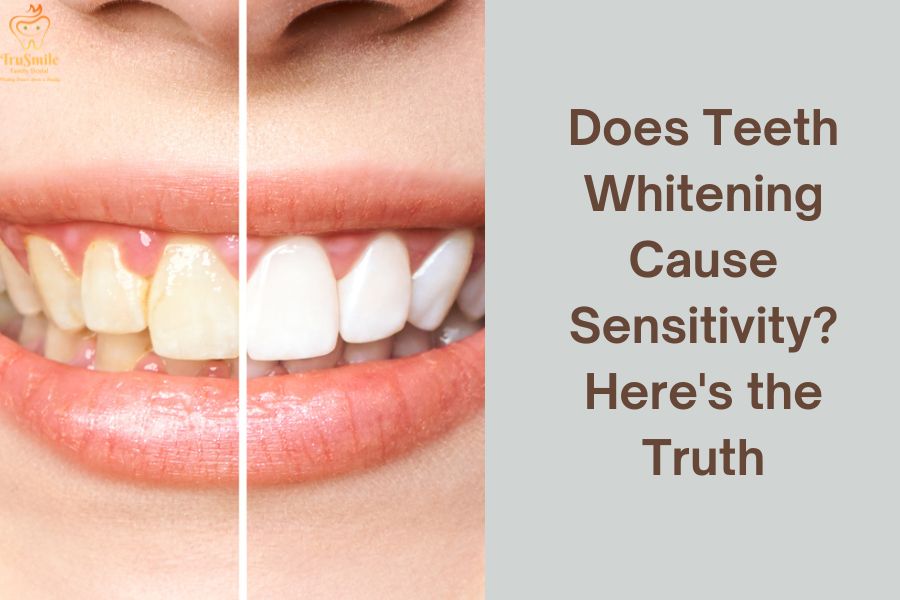- 21 August, 2024

Does Teeth Whitening Cause Sensitivity? Here's the Truth
Teeth whitening is a popular cosmetic dental treatment that can dramatically brighten your smile. However, many people are concerned about the potential for sensitivity during or after the whitening process. At TruSmile Family Dental, we often hear questions like, “Does teeth whitening cause sensitivity?” In this blog, we’ll dive into the truth behind this common concern and offer tips to manage and prevent sensitivity if it does occur.
What Causes Sensitivity During Teeth Whitening?
Teeth whitening treatments work by using bleaching agents like hydrogen peroxide or carbamide peroxide to penetrate the enamel and break down stains. This process can temporarily expose the dentin, the layer beneath the enamel, which contains tiny tubules that lead to the tooth’s nerve center. When these tubules are exposed, they can cause a short-term increase in sensitivity to hot, cold, or sweet stimuli.
Is Sensitivity After Teeth Whitening Common?
Yes, sensitivity is a relatively common side effect of teeth whitening, but it’s usually temporary. Most people who experience sensitivity after whitening treatments report that it lasts only a few days. The level of sensitivity can vary depending on the individual’s oral health, the strength of the whitening agent, and the duration of the treatment.
How to Minimize Sensitivity During and After Whitening
If you’re concerned about sensitivity, there are several steps you can take to minimize discomfort during and after teeth whitening:
● Choose Professional Whitening: Professional teeth whitening at TruSmile Family Dental is performed under the supervision of a dentist, ensuring that the treatment is tailored to your needs. This can reduce the risk of sensitivity compared to over-the-counter products.
● Use Desensitizing Products: Your dentist may recommend using a desensitizing toothpaste or gel before and after your teeth whitening treatment in milpitas. These products can help block pain signals from reaching the nerves in your teeth.
● Opt for Lower Concentration Whitening: If you have a history of sensitive teeth, your dentist may suggest using a lower concentration of whitening agent or spreading out treatments over a longer period.
● Limit Exposure Time: Reducing the time that the whitening agent is in contact with your teeth can also help prevent sensitivity. Your dentist will guide you on the optimal duration for your specific case.
● Avoid Hot or Cold Foods: After whitening, try to avoid consuming very hot or cold foods and drinks, as these can exacerbate sensitivity.
● Follow Post-Treatment Care: Your dentist will provide specific aftercare instructions, such as avoiding staining foods and using fluoride treatments, to help protect your teeth and reduce sensitivity.
Should You Be Worried About Teeth Whitening Sensitivity?
While sensitivity is a possible side effect, it shouldn’t deter you from achieving the bright smile you desire. At TruSmile Family Dental, we take every precaution to ensure your comfort during the whitening process. If you experience any discomfort, we’re here to help you manage it effectively.
Final Thoughts
Teeth whitening is a safe and effective way to enhance your smile when done correctly. While sensitivity can occur, it is typically mild and temporary. By choosing a professional teeth whitening in milpitas and following your dentist’s advice, you can enjoy a brighter smile with minimal discomfort.
If you’re considering teeth whitening and have concerns about sensitivity, contact TruSmile Family Dental today. Our team is ready to answer your questions and help you achieve the dazzling smile you’ve always wanted.
